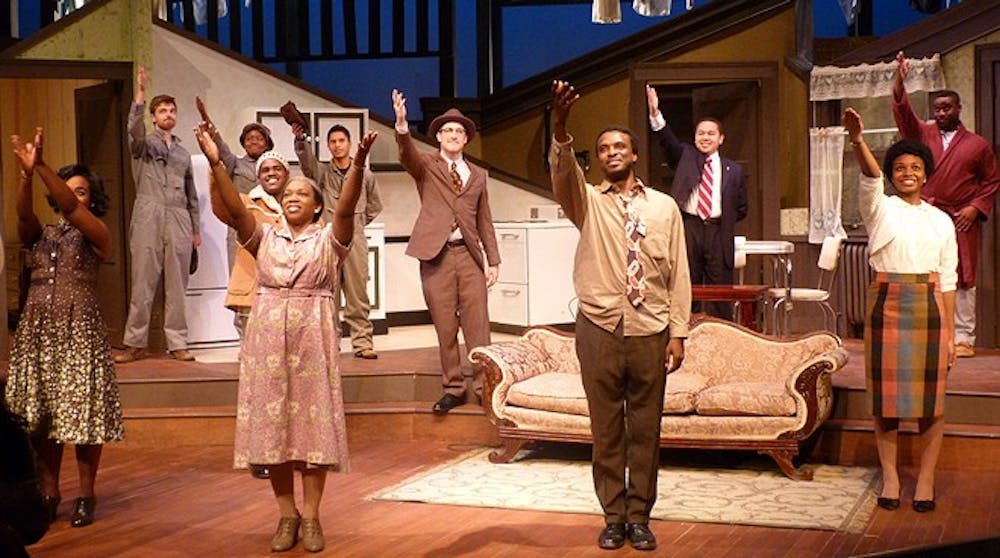The University of Richmond Department of Theater and Dance presented a masterful production of Lorraine Hansberry's seminal Civil Rights-era work this past weekend, "A Raisin in the Sun". The African-American poet Langston Hughes more than six decades ago begins the play with a poem that reads, "What happens to a dream deferred? / Does it dry up / like a raisin in the sun?"
The story of Hansberry's Tony Award-nominated piece centers around the daily struggles of a working-class, African-American family living in a city following World War II, and at the cusp of the Civil Rights Movement. Protagonist Walter Lee Younger lives in a small, dingy apartment with his wife, widowed mother, sister, and son. The death of Younger's father left his mother, Lena Younger, with a $10,000 life insurance payment (roughly $100,000 today).
Lena is intent on fulfilling her late husband's dream of owning their own house, while Walter Lee, chafing in his humiliating job as a chauffeur to a wealthy, white family, dreams of founding a business. They clash repeatedly, all while Walter's sister Beneatha Younger not-so-quietly pursues her own search for self-identity, love, and her then controversial dream of becoming a doctor. Together, the family endures hope, a crushing disappointment, and thinly veiled racism in a quest to live their own American dream.
Of the thirteen-member cast for "A Raisin in the Sun", eight are UR undergraduate students, one is a student at the School of Law, and one is an alumnus. The production contained several students who were relatively new to acting.
Sophomore Taryn-Elyse Smith, who acted as Beneatha Younger, considers this experience her "first big theater role," she said. Though she had performed theater in high school, she had initial reservations about doing drama at UR. She said: "...when I got to college, I was so busy with classwork to really dedicate my time to the theater, and honestly I was a little intimidated. In college there's so many people here that have an extensive background in the arts so I didn't think I really would have a chance. But I decided to take a chance with this production and when\0x2028 I was casted ... I was ecstatic!"
For senior Wilshire Bethel, who acted as one of Beneatha's love interests, the play was his first-ever theater experience. "This is my senior year, and doing a theater production was one of [the things I wanted to do while at UR]," he said.
These young actors and actresses discovered that a role involves more work than they originally thought. Smith said she had thought it was simply learning lines and stage movement.
"But the director, Chuck Mike, would often ask us why our character was saying what they said or doing what they did," she said. "So I started to really think about Bennie, who she was and her mannerisms."
Smith eventually made a personal connection to her character. "She's a college student trying to pursue a career in a field that was really unheard of for women at that time," she said. "I want to become an actuary and not many women are in the math field so in that respect I understand Bennie."
Chuck Mike, a professor of theater at the university, directed the play. He said his first experience seeing "A Raisin in the Sun" was as a child at the original Broadway staging with Sidney Poitier, Ruby Dee and Ossie Davis. "It was the first play on Broadway that was African-American: written by an African-American," Mike said, "a female African-American." Mike studied theater at Fordham University in New York City, and founded a theater company in Nigeria, where one of his first acting roles there was as Walter Lee Younger. Since then, he has directed or been involved with productions of "A Raisin in the Sun".
The acting and directing of "A Raisin in the Sun" came together on an innovative set created by University of Richmond's resident designer W. Reed West, III. Crammed with all of the belongings of an extended family, but open for dramatic movements and gestures, the set completes a play that Mike calls "realism at its finest." This is achieved through various generational stage decor, such as the 1950s era refrigerator that still works, and a real stove that Jenna Flack (Ruth Younger) cooks real eggs on during the first act.
A crew run by stage manager Walter L. Schoen kept track of these many items, clearing them off and/or rearranging them quickly between scenes. Costumes designed by Thom Heyer complemented the set and the setting without blending in too much.
Enjoy what you're reading?
Signup for our newsletter
"A Raisin in the Sun", Mike said, "impacts people as much today as it did in the '50s."
"A play like [this] is celebrating the human spirit; anybody can relate to that," Mike said.
He said he felt that the struggles of Walter Lee Younger are relatable to college students: "I think many students come here and don't understand the usefulness of failure. There's value in not having done well, because I'm now going to have to find out how to do better."
Smith identified with the piece's emphasis on family. "How, despite any challenges that life throws your way," she said, "it only takes one person to keep the entire family from falling apart."
"I started noticing things I didn't before and a lot of [Lena Younger's] words of wisdom made me reflect on my own life," Smith said, "Once again I became Bennie, finding my identity again."
Contact reporter Ben Panko at ben.panko@richmond.edu.
Support independent student media
You can make a tax-deductible donation by clicking the button below, which takes you to our secure PayPal account. The page is set up to receive contributions in whatever amount you designate. We look forward to using the money we raise to further our mission of providing honest and accurate information to students, faculty, staff, alumni and others in the general public.
Donate Now



